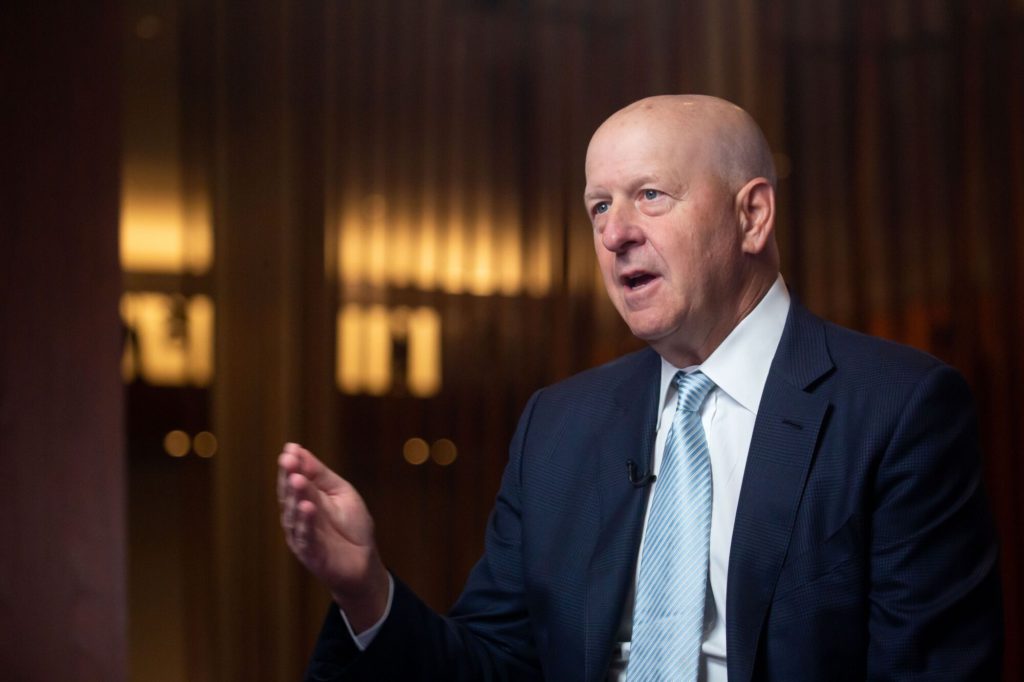Goldman Sachs Group Inc.’s profit plunged as the Wall Street giant notched one of its weakest quarters under Chief Executive Officer David Solomon.
(Bloomberg) — Goldman Sachs Group Inc.’s profit plunged as the Wall Street giant notched one of its weakest quarters under Chief Executive Officer David Solomon.
Second-quarter earnings fell 58% on an investment-banking slump, real estate markdowns and a goodwill writedown in the consumer business, which houses the GreenSky lending business. Return on equity, a key measure of profitability, slid to 4% — the worst among the top US banks.
The firm had been actively tamping down expectations heading into the report, prompting analysts to slash their estimates for quarterly profit by almost half since mid-June. Still, executives sought to strike a more hopeful note for the months ahead. Shares of the company advanced 1.5% at 10:47 a.m. in New York.
Solomon said the mergers and capital-markets business is “a fundamental part of our economy” that isn’t going to disappear, even though it’s been depressed for several quarters. “I think this is a cycle,” the CEO said on a call with analysts. “We haven’t seen a cycle in a while, and the other side of the cycle will continue to look attractive.”
Goldman’s management has been working to smooth the firm’s sometimes volatile quarterly results, which featured big gains during the post-pandemic boom followed by a run of missed profitability goals. Investors are looking to see whether the second quarter represents a trough for the New York-based company, with a steadier run of earnings gains ahead.
“They’ve come out and revealed all the problems,” said Sandy Pomeroy, a money manager at Neuberger Berman Group. “They need to come out and articulate some confidence that we are at the bottom from a cyclical perspective and that they’ve cleaned up all of their problems.”
Pomeroy, who bought Goldman stock in January after it had tumbled from its 2021 high, said she’s willing to be patient to give management time to clean up some of the mess. “This is clearly a battleground stock for investors,” she said. “Probably more so than any other” peer in the financial-services space.
Equity-trading revenue was one bright spot, coming in ahead of the firm’s major rivals at $3 billion, compared with estimates for $2.47 billion. Goldman has now clinched the top rank in that business in three of the past four quarters.
Notably, total trading revenue was down just 14% when compared to restated numbers from last year. That’s a much smaller drop than the 25% decline Goldman President John Waldron had warned of in early June.
The asset-and wealth-management business posted revenue of $3.05 billion, down 4% from a year earlier and below analysts’ estimates for $3.5 billion. The unit was buffeted by the bank’s exposure to the real estate sector, with writedowns both on its lending portfolio and its equity investments contributing to a $1.15 billion pretax earnings hit tied to principal investments.
Unlike most of its major competitors, Goldman has aggressively used its own balance sheet to make investments, a strategy that can lead to big swings in results. The firm has been looking to rely more on fees from investing money for other institutions and cut back its own wagers.
The bank also reported a jump in operating expenses due to how it accounts for impairments tied to some of its consolidated real estate investments as well as the goodwill writedown. The impairments totaled about $1 billion.
Goldman has been pursuing a sale of the GreenSky business just over a year after completing its purchase — one of the most visible signs of how dramatically management has backtracked on the pursuit of its retail-banking strategy in the past year. It also got rid of substantially all of its Marcus loan portfolio, recognizing a roughly $100 million gain from that.
Another noticeable drag on earnings was the jump in taxes tied to non-US earnings. That bumped up the firm’s effective tax rate to 22.3% so far this year, up from just 19% at the end of the March.
Other key results:
- Fixed-income traders brought in $2.71 billion, down 26%. Expectations were for $2.81 billion.
- Investment-banking revenue of $1.43 billion fell short of analysts’ average estimate of $1.51 billion. Equity underwriting climbed from a year earlier and advisory fees plunged. Bankers have cautioned that even when dealmaking rebounds, the low volume of announced mergers so far this year could keep the pressure on through the rest of the year.
- Revenue dropped 8% to $10.9 billion, compared to analyst estimates of $10.5 billion.
- Total assets under supervision increased to a record $2.71 trillion, up from $2.67 trillion as of March 31.
(Updates with CEO’s comment in fourth paragraph.)
More stories like this are available on bloomberg.com
©2023 Bloomberg L.P.










